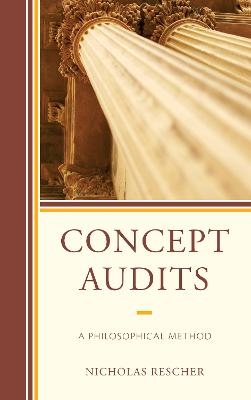
Concept Audits
Lexington Books (Verlag)
978-1-4985-4041-4 (ISBN)
Concept auditing is based on an innovative premise for philosophers: when they address an everyday life conception on the order of knowledge, truth, justice, fairness, beauty, or the like and purport to be dealing with what it involves, then they must honor the existing meanings of these terms. And insofar as the prevailing meaning is being contravened, they must explain how and justify why this is being done. They must, in sum, explain how their treatment of a topic relates to our established pre-systematic understanding of the issues involved and relate their deliberations to the prevailing conception of the matter they are proposing to discuss. The aim of a concept audit is to consider to what extent a given philosophical discussion honors this communicative obligation.
Concept Audits sets out not only to explain and defend this procedure, but also to consider a host of applications and exemplifications of these ideas. Nicholas Rescher shows how this method of conceptual auditing can function to elucidate and evaluate philosophical theses and doctrine across a wide spectrum of issues, ranging from logic to ethics and metaphysics. Accordingly, he explains and illustrates an instructive innovation in philosophical method. This new study of philosophical methodology presents its method in a clear and convincing way and shows the method at work with respect to a wide spectrum of important philosophical issues.
Nicholas Rescher is professor of philosophy at the University of Pittsburgh.
PREFACE
I.METHODOLOGY
1.Introduction: The Concept Auditing Process
II.SOME HISTORICAL APPLICATIONS
2. The Socratic Method as an Illustration
3.Neo-Platonic Wholes
4.Descartes and Generalization
5.Spinoza on Things and Ideas
6.Kantian Absolutism in Moral Theory
7.Mill on Desirability
8.Ordinary Language Philosophy on the Nature of Knowing
9.Russell-Gettier on the Analysis of Knowledge
10.Concept Dialectics in Historical Perspective
11.Metaphysical Illusions
III.FURTHER ILLUSTRATIVE APPLICATIONS
12.Who Dun It?
13.Existence: To Be or Not to Be
14.Explanatory Regression
15.The Fallacy of Respect Neglect
16.Appearance and Reality
17.On the Truth about Reality
18.Sameness and Change
19.Origination Issues
20.Shaping Ideas
21.Construing Necessitation
22.Conceptual Horizons
23.Language Limits
24.On Certainty
25.Timeless Truth
26.Assessing Acceptability
27.Value Neutrality in Science
28.Personhood and Obligation
29.Control Issues
30.Fairness Problems
31.The Ethics of Delegation
32.Doing unto Others
33.Faux Quantities
34.Luck vs. Fortune
35.The Problem of Progress
36.Issues of Excellence
37.Problems of Perfection
IV.CONCLUSION
38.Concluding Observations
| Erscheinungsdatum | 10.05.2021 |
|---|---|
| Verlagsort | Lanham, MD |
| Sprache | englisch |
| Maße | 151 x 221 mm |
| Gewicht | 295 g |
| Themenwelt | Geisteswissenschaften ► Philosophie ► Geschichte der Philosophie |
| Geisteswissenschaften ► Philosophie ► Philosophie der Neuzeit | |
| Geisteswissenschaften ► Philosophie ► Sprachphilosophie | |
| Geisteswissenschaften ► Sprach- / Literaturwissenschaft ► Sprachwissenschaft | |
| ISBN-10 | 1-4985-4041-4 / 1498540414 |
| ISBN-13 | 978-1-4985-4041-4 / 9781498540414 |
| Zustand | Neuware |
| Haben Sie eine Frage zum Produkt? |
aus dem Bereich


